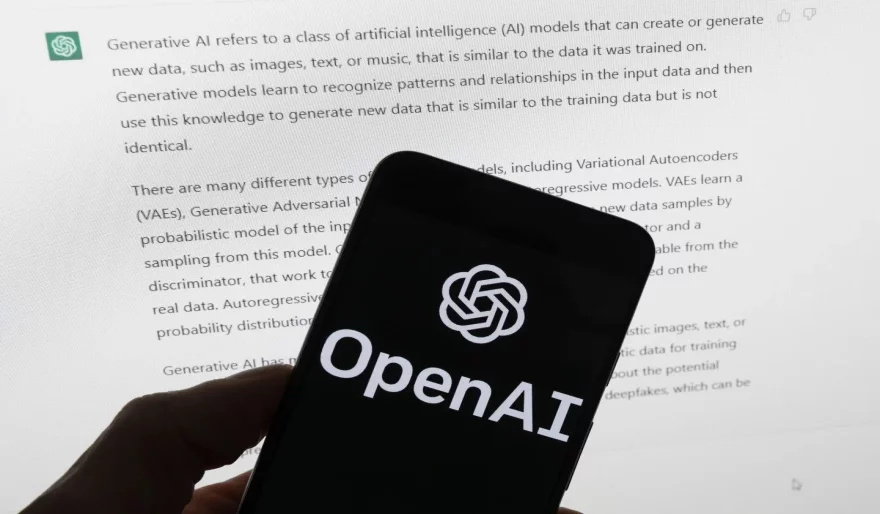OpenAI Faces FTC Probe: Implications For AI Development

Table of Contents
The FTC's Concerns Regarding OpenAI
The FTC's investigation into OpenAI likely centers on several key areas, each with significant implications for the future of AI.
Data Privacy Violations
A primary concern for the FTC is the potential violation of consumer privacy related to data collection and usage in training OpenAI's models. The vast datasets used to train large language models like GPT-4 contain an enormous amount of personal information scraped from the internet.
- Consent: The FTC is likely scrutinizing whether OpenAI obtained proper consent from individuals whose data was used in training its models. The lack of explicit consent for the use of personal data in this context is a major point of contention.
- Data Security: The security measures employed by OpenAI to protect the sensitive data used in its training processes are under investigation. Breaches or vulnerabilities could expose personal information and lead to severe legal consequences.
- Misuse of Sensitive Information: The FTC will investigate whether OpenAI has adequately safeguarded against the misuse of sensitive information, such as medical records or financial data, which may be present in the training datasets. This includes evaluating whether appropriate de-identification techniques were applied.
- Relevant Regulations: The investigation will likely examine compliance with regulations like the California Consumer Privacy Act (CCPA) and the General Data Protection Regulation (GDPR), which dictate how personal data should be collected, used, and protected.
Algorithmic Bias and Fairness
Another area of concern is the potential for algorithmic bias within OpenAI's AI models. AI systems trained on biased data can perpetuate and even amplify existing societal biases, leading to discriminatory outcomes.
- Examples of Bias: AI models can exhibit bias in various ways, including gender bias (favoring male pronouns), racial bias (showing preference for certain ethnicities), and socioeconomic bias (disproportionately favoring certain demographics).
- Detecting and Mitigating Bias: Identifying and mitigating bias in AI models is notoriously difficult, requiring rigorous testing, auditing, and ongoing monitoring. The FTC will likely evaluate OpenAI's efforts in this area.
- Legal Ramifications: Deploying biased AI systems can have severe legal ramifications, leading to discrimination lawsuits and reputational damage. The FTC is concerned with ensuring fairness and accountability in AI deployments.
- Algorithmic Accountability: The concept of algorithmic accountability requires transparency and explainability in how AI systems make decisions. The FTC's investigation will likely examine whether OpenAI's models meet these standards.
Misleading Marketing and Transparency
The FTC may also investigate whether OpenAI's marketing and promotion of its technologies are misleading or lack sufficient transparency about the limitations and potential risks of its AI systems.
- Misleading Claims: Overly enthusiastic marketing claims about AI capabilities can mislead consumers and create unrealistic expectations. The FTC is concerned with ensuring accurate and honest representations of AI technology.
- Transparency in AI Capabilities: OpenAI should clearly communicate the limitations of its AI systems, including potential inaccuracies, biases, and the potential for misuse.
- Consumer Protection: The FTC's mandate includes protecting consumers from unfair or deceptive business practices. Misleading marketing of AI technology directly contradicts this principle.
Implications for the AI Industry
The OpenAI FTC probe has significant implications for the broader AI industry, far beyond OpenAI itself.
Increased Scrutiny and Regulation
This investigation sets a precedent for increased regulatory oversight of AI development and deployment. Expect more scrutiny of AI companies' data practices, algorithmic fairness, and marketing claims.
- Impact on Funding: Increased regulatory uncertainty could impact funding for AI startups and research initiatives. Investors might become more cautious in an environment of heightened regulatory risk.
- Development Timelines: Companies may need to allocate more time and resources to comply with new regulations, potentially slowing down development timelines.
- Business Models: The business models of some AI companies might need to be adjusted to comply with stricter data privacy and algorithmic fairness requirements.
- New Regulations and Standards: The OpenAI FTC probe is likely to accelerate the development of new regulations and industry standards for responsible AI development.
Impact on Innovation and Development
Heightened regulatory uncertainty could have a chilling effect on innovation, creating a cautious environment for AI development.
- Balance Between Innovation and Responsible AI: The challenge lies in finding the right balance between fostering innovation and ensuring responsible AI development. Overly stringent regulation could stifle progress.
- Potential for Stifling Progress: Excessive regulations could discourage experimentation and the development of cutting-edge AI technologies.
- Responsible AI Guidelines: The need for clear and comprehensive guidelines for responsible AI development, promoting collaboration between industry, regulators, and ethicists, becomes crucial.
Shifting Consumer Trust and Perceptions
The OpenAI FTC probe could significantly impact public trust and perception of AI technologies.
- Ethical AI Development: The importance of ethical AI development practices cannot be overstated. Building public trust requires a commitment to transparency, accountability, and fairness.
- Building Consumer Trust: To maintain consumer trust, AI companies must demonstrate their commitment to responsible AI practices and address public concerns about AI safety and reliability.
- Addressing Public Concerns: Open communication and proactive engagement with public concerns about AI are vital to mitigating negative perceptions.
The Future of AI Development in Light of the OpenAI FTC Probe
The OpenAI FTC probe will likely lead to significant changes in AI development practices and the regulatory landscape.
- Ethical AI Frameworks: The adoption and implementation of robust ethical AI frameworks will become increasingly important.
- Improved Data Privacy Measures: Companies will need to invest in more sophisticated data privacy measures to comply with new regulations and build consumer trust.
- Greater Transparency in AI Systems: Transparency regarding how AI systems make decisions and the data used in training will be crucial for building public confidence.
- Industry Collaboration and Self-Regulation: Industry collaboration and self-regulation will play an increasingly important role in shaping the ethical landscape of AI.
Conclusion
The FTC's investigation into OpenAI marks a critical turning point in the development of artificial intelligence. The OpenAI FTC probe underscores the urgent need for ethical considerations, data privacy protections, and algorithmic fairness in the design and deployment of AI systems. The investigation's outcome will significantly shape the future of AI development, potentially leading to increased regulation, greater transparency, and a renewed focus on responsible innovation. Stay informed about the ongoing OpenAI FTC probe and its implications for the future of AI. Follow developments in AI regulation and promote responsible AI development to ensure a future where AI benefits all of humanity. Learn more about the impact of the OpenAI FTC probe and how it shapes the ethical landscape of artificial intelligence.

Featured Posts
-
 Amundi Msci World Ex Us Ucits Etf Acc Nav Calculation And Implications
May 24, 2025
Amundi Msci World Ex Us Ucits Etf Acc Nav Calculation And Implications
May 24, 2025 -
 Italian Citizenship The Revised Law On Great Grandparent Claims
May 24, 2025
Italian Citizenship The Revised Law On Great Grandparent Claims
May 24, 2025 -
 3 En Tutumlu Burc Para Yoenetimi Ve Tasarruf Teknikleri
May 24, 2025
3 En Tutumlu Burc Para Yoenetimi Ve Tasarruf Teknikleri
May 24, 2025 -
 Philips Convenes Annual General Meeting What To Expect
May 24, 2025
Philips Convenes Annual General Meeting What To Expect
May 24, 2025 -
 Analysis Sses 3 Billion Spending Reduction And Its Implications
May 24, 2025
Analysis Sses 3 Billion Spending Reduction And Its Implications
May 24, 2025
Latest Posts
-
 Co Hosts Of Today Show Address Long Term Anchor Absence
May 24, 2025
Co Hosts Of Today Show Address Long Term Anchor Absence
May 24, 2025 -
 Concerned Co Hosts Address Popular Today Show Anchors Absence
May 24, 2025
Concerned Co Hosts Address Popular Today Show Anchors Absence
May 24, 2025 -
 Today Show Anchors Absence A Message From Her Co Hosts
May 24, 2025
Today Show Anchors Absence A Message From Her Co Hosts
May 24, 2025 -
 Explanation For Anchors Absence From Today Show Co Hosts Speak Out
May 24, 2025
Explanation For Anchors Absence From Today Show Co Hosts Speak Out
May 24, 2025 -
 Today Show Co Hosts Reveal Concerns During Anchors Absence
May 24, 2025
Today Show Co Hosts Reveal Concerns During Anchors Absence
May 24, 2025
